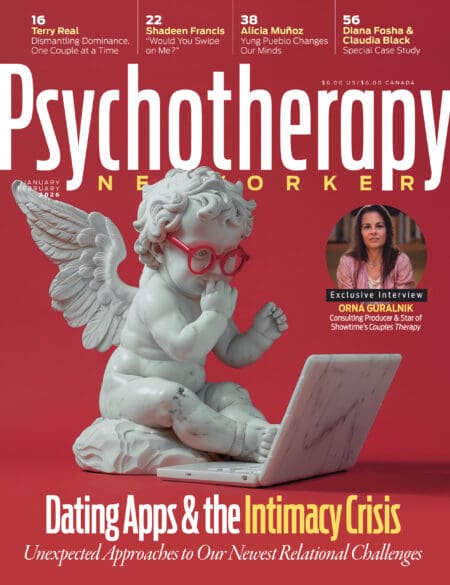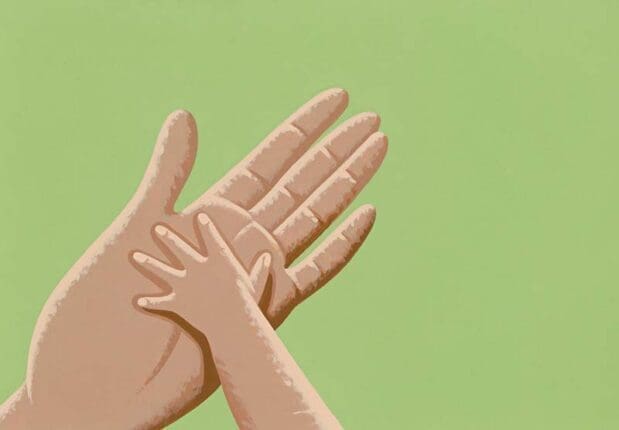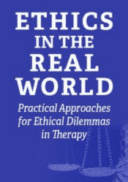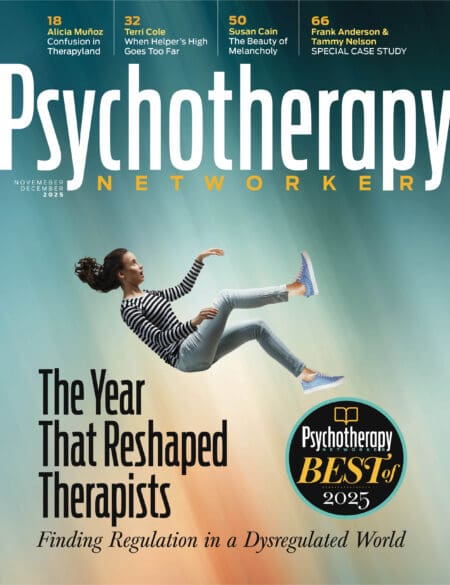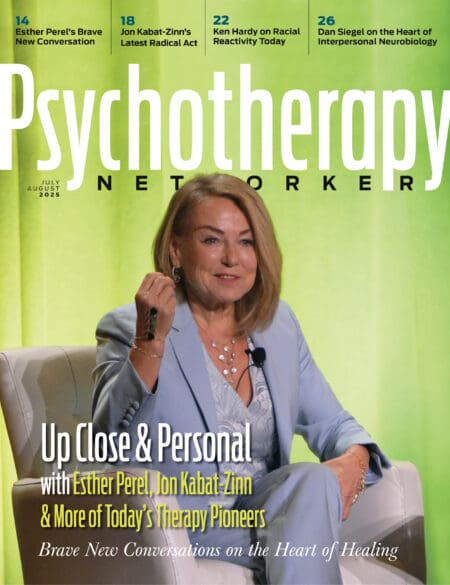Enjoy the audio preview version of this article—perfect for listening on the go.
Week after week, even though my client Naomi looked like she wanted to fire me, eviscerating me with her withering gaze, she kept coming back. It was distressing and bizarre, as if I’d been cast in the role of therapist by a director who hated my performance. Why is she doing this to us? I thought every time she took her position on the couch. I wanted to say, “I suppose you’re wondering why I forced you here today,” or sometimes just, “What?!?!” But I didn’t. While I’m neither snarky nor confrontational as a therapist, whoever I am clearly wasn’t enough for Naomi. And she showed up every week—for years—to make sure I realized that.
Like some scene in Groundhog Day, each session was a repeat of the last. She’d present a puzzle I couldn’t solve: something like, “No one will ever love me.” And however I’d respond—with humor, an interpretation, a reflection of her doubt, an identification with her despair, a deconstruction of her irrational beliefs—no matter what technique I used—CBT, EFT, LMNOP—even if I just listened quietly, her next line was always the same: “What am I supposed to do with that?!”
At times like this, when it feels like my clients are rejecting me—not just my efforts to help them, but me—I remind myself of what my acting teachers would tell us in drama school: “You are enough.” They wanted us to believe that we had within us the capacity to be anyone, even the characters that seemed far beyond our reach.
Of course, I learned early on as a young actor that—unlike my drama teachers, and very much like Naomi—many casting directors don’t think you’re enough. I’ve elicited eye rolling, yawning, and looks of palpable dismay the moment I entered an audition room. One guy went so far as to respond to my introduction, “Hi, I’m Mark O’Connell,” by glancing at my headshot, giving me a once over, and declaring simply, “No, you’re not.” That was how it felt to share the therapeutic stage with Naomi, an audition that allowed only one possibility: that I was wrong for the role.
One day, as I sat dreading my upcoming session with Naomi, I was surprised to recognize an emotion that had been burgeoning inside me: hate. I hated that no matter what I tried, no matter how far I reached, I wasn’t enough for her. And I hated the fact that I felt hate. Hate wasn’t me, especially not the me I tried to portray in my therapist headshot. But at the same time, I felt relieved to connect with this feeling. It was liberating, even delicious, to identify it. Hate, hate, hate.
On the other hand, as Naomi would say, what was I supposed to do with that?! She already hated herself and believed everyone else hated her too. In her childhood, her father had trumped every personal achievement she’d shared with him with a more impressive accomplishment by one of her siblings; she’d been bullied in high school whenever she’d sought attention; and her mentors in her MFA program had incessantly picked apart her technical imperfections while praising the natural talents of her peers.
She certainly didn’t need to feel hated by yet another person in her life, especially not her therapist. Then again, I thought, perhaps my own hatred of being endlessly scrutinized and dismissed by her could help me join her perspective. After all, it wasn’t Naomi that I hated. (I actually liked her; I thought she was funny, talented, and clever.) I hated the dilemma we were both stuck in.
Naomi entered the room that day as usual, with a sneer that announced she was sure I’d fail her yet again. She’d just been denied a much-coveted job, and she dropped that piece of news like bait, before retreating in punishing silence: my cue to feel like a lousy scene partner. But this time, rather than try to overcompensate for my inadequacy—with forced jokes, or clinical advice she could get from Instagram—I tried to “stay in the feelings,” as my acting mentors would say.
I allowed the chill of failure, hers and mine, to tingle through my body. Then I took a risk: “Sometimes it feels like you . . . hate me, but you don’t know how to say it,” I posited. I relished saying the word hate, inviting her to participate in the pleasure of directly expressing such a forbidden feeling. For the first time, I felt fully present in the room with her. “You hate me because I can’t give you the things in your life you want, but you don’t say that because you know it sounds irrational, so you stay silent. And give me the hate.” As I said this, I carefully checked inside, making sure I wasn’t speaking from on high, or with blame, but with curiosity and perhaps a sense of possibility.
“Well, sure.” She shrugged. “But I don’t know what to do with that. I can’t go around telling people I hate them for not giving me what I want.”
“Maybe not,” I said. “But at least we can talk about it, how much you hate me.”
We both smiled, and in that moment, something between us opened up. Our next few sessions continued to be full of energy and movement. Who knew that uttering such an ugly, poisonous word could be so freeing? Now when she’d shoot me that withering look, she’d catch herself and say, “I’m doing it again, aren’t I? I’m being ‘Her.’” Her is what we began to call the version of Naomi that believed no one could help her—and hated anyone who tried. We described Her like a drag persona with “warrior-princess realness.” We imagined Her in a wig with fierce contoured makeup, slaying anyone in her path with that signature glare.
As it turns out, Naomi’s mother was the first person to be on the receiving end of that signature glare. Growing up, she’d hated that her mother couldn’t show her how to be empowered and self-possessed in the face of her father’s demeaning remarks. And now, as her mother’s health was beginning to decline, Naomi hated herself for feeling that hatred. Painful as this narrative was to construct, she seemed relieved to be sharing it. We collaborated on bringing it to life, with curiosity, compassion, and whimsical references to RuPaul’s Drag Race.
Success! After so many years, I was finally good enough to play Naomi’s therapist. And then she fired me.
Well, not exactly. A few weeks later, my husband and I got the miraculous news that we’d been chosen to adopt a baby and would have to go out of town for several weeks to be present for the birth. We’d been cast in the roles of our lives: dads!
I gave all my clients the option to do remote sessions while we were gone, and most of them took me up on it. But not Naomi. She said she’d been thinking it might be time to take a break anyway—which brought that relentless feeling of failure with her rushing back. At least I had my new rewarding role as a parent to look forward to.
Then our son arrived, and the moment the doctor handed him to us, he screamed and screamed and screamed. My love for him was instant, and I’d like to imagine that he felt the same way. But the thing about infants, especially colicky ones, is that, like Naomi, they don’t let us know when you’re enough for them, but they’re crystal clear when you’re not.
As the sleepless weeks became months, that sweet little chub-chub screamed inconsolably through the night. I’d heard that baby cries are used as a form of torture: I totally get that now. Running on no sleep, I’d rummage in the dark in search of wipes and diapers—and formula I forgot to prepare—as his cries of disapproval escalated higher and higher. All the while, it was as if my son was saying to me, “Dude! You’re failing! You’re not right for this role.”
Although my own father had died 20 years earlier, I longed for him to comfort me during these nights. No matter how miserable I’d been growing up, or how much I’d taken it out on him, he’d responded with something encouraging like, “You’ll be okay, Marco Polo,” or “You’ll get through this m’boy.” Sometimes he’d even manage to transform my distress into something playful, like the time he turned my tantrum into Godzilla the Musical. I remember feeling held by him, not just by his arms, but by his warmth, his creativity, and his sense of hope. Tapping into those qualities seemed beyond my capability in those early months with my son. I was just too exhausted, too trapped in my own self-doubt.
Then, one day, while trying to recognize myself in the mirror through bloodshot eyes, I thought, maybe my dad had felt just as defeated as I did, but rather than collapse in failure, he’d used his own despair as a pathway to understanding me and offering me comfort in mine. I suddenly got the connection between what had happened with me and Naomi and the challenge I now faced with my seemingly inconsolable son.
The next time my son started screaming and holding auditions for the role of midnight comfort-giver, rather than fearing defeat, I looked at his red, fiercely contorted face and said, “I know you hate this, m’boy. You probably even hate me right now. I understand, I’d hate me too. But we’re gonna get through this. You’re gonna be okay.” Channeling my dad’s playful spirit, I then sang my British rock-star version of “Five Little Monkeys.”
He didn’t stop screaming the first time. But little by little, after weeks of allowing this shift to unfold inside me, he calmed down during diaper changes. Eventually, he even responded to my efforts with an obliging giggle. Sleep deprived as I continued to be, I was trusting more and more that I was enough for him, that I was right for the role of his dad. I used my identification with his helplessness as a bridge between us, even if his gratitude for these efforts might never be obvious to me in my lifetime. Then something unexpected happened.
One morning, suffering from a bad case of baby-brain, I barreled into a coffee shop in my neighborhood. Clearly having gotten dressed in the dark, I sported bright orange sweatpants, a green flannel shirt, and quite possibly an argyle sock static-clung to my shoulder like a sash. As I walked through the door in this state, who should I make eye contact with but Naomi.
Instantly, aware of my wasted look, the dark circles under my eyes, and the disaster zone of my uncombed hair, I was seized with a sense of ice-cold humiliation. Ugh, I groaned to myself. This is only going to confirm what she’d thought of me all along: I’m a hot mess. Then I let that go, and felt myself suffused with the feelings of steadiness and calm that caring for my son had helped me discover inside myself.
Later that day I got an email from Naomi. It read: “It was nice to see you today. I’ve been thinking about you. I wish I’d been able to thank you for all your help sooner. You sat with me patiently, with warmth and care, for years, despite my often being silent and inconsolable. Without a doubt, you’ve improved my life, and I want you to know how grateful I am.”
I don’t remember exactly what happened that night. I’m sure my son screamed and there was still some part of me that felt triggered. But my chance meeting with Naomi reminded me of how far I’d come as a parent. Deep inside I knew his earsplitting cries were not about my not being enough. On the contrary, like Naomi, he was trusting me just to be with him, to validate his feelings, and to invite him to dream of possibilities he’s unable to imagine on his own.
The covid-19 pandemic meant our storytellers didn’t get a chance to perform on the big Symposium stage in 2020, so they recorded their stories at home. Here’s what happened:
ILLUSTRATION BY ADAM NIKLEWICZ
Mark O'Connell
Mark O’Connell, LCSW-R, MFA, is a psychotherapist and author in New York City. He teaches workshops based on his book The Performing Art of Therapy: Acting Insights and Techniques for Clinicians, and writes for Psychology Today and The Huffington Post, as well as clinical journals.
